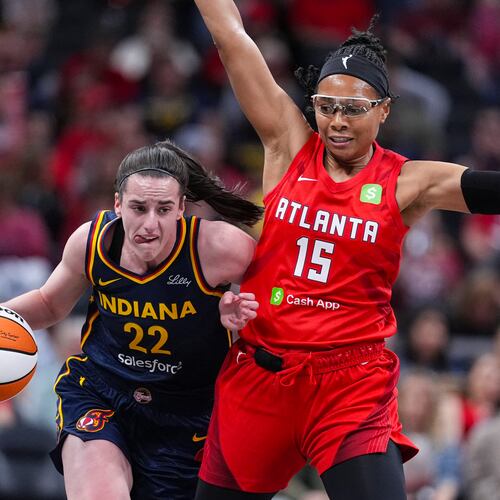Though any NCAA penalty is “severe,” Georgia Tech athletic director Dan Radakovich and men’s basketball coach Brian Gregory sounded a note of cautionary optimism Friday, a day after mostly bad news for the Yellow Jackets.
“Anytime there’s a penalty that affects recruiting, it’s not a good thing,” said Gregory, who described the penalties as reflecting minor violations. “When you’re trying to build back the program, with a new culture and adding to that culture by bringing in the right type of player ... it’s impaired a little bit. We’re going to have work double-time, fit 48 hours into a 24-hour day.”
The NCAA on Thursday placed Tech on four years’ probation and enacted the following penalties as the results of a 20-month investigation into the football and men’s basketball programs:
- A reduction of two men's basketball recruiting days during the 2011 summer evaluation period (self-imposed by the university).
- A limit of 10 official visits for men's basketball for the 2011-12 and 2012-13 academic years.
While the football team took a morale hit with punishments that included the loss of its 2009 ACC championship, it suffered no scholarship reductions or recruiting restrictions. Basketball must now deal with limitations on recruiting, playing in two home arenas for the 2011-12 season as a new on-campus arena is built and the unexpected loss of two key players during the offseason. Radakovich said it’s simply more challenges that must be overcome.
“Yes, it will be a challenge, but our team understands the circumstances [two arenas] and looks forward to the payoff in 2012-13,” Radakovich said in an email.
Gregory, who was hired from Dayton earlier this year, was told about the investigation during the interview process. Gregory said he has no ill feelings toward former Tech coach Paul Hewitt and that he hasn’t spent a lot of time trying to figure out if the penalties fit the violations. He said to do so would be a waste of time.
Though he was mostly a bystander, Gregory said he was impressed by how Tech handled itself and by its plan moving forward. Tech recently added a third compliance officer. The department previously had two such employees, neither of whom are still at Tech. Paul Parker, the former head of compliance, now works at Auburn. Katreshia Louis left to join North Carolina A&T. Both have been replaced.
“We will come out of this stronger where no one can question Tech’s integrity,” Gregory said.
Hewitt, who was fired by Tech in March and later hired at George Mason, said he’s disappointed in the NCAA’s decision and that Gregory has to deal with the penalties.
“I feel bad that Brian has to do this,” Hewitt said. “I feel bad that they are doing this with the Georgia Tech basketball program. It’s very unfair.”
The NCAA’s inquiry into the basketball team started separately from its look at football. They were rolled into one investigation.
Radakovich said Thursday that the violations will not affect the $7.2 million owed to Hewitt as part of his contractual buyout. In the Public Infractions Report, the NCAA says it believed the infractions to be major, while Tech thought they were minor. That’s an important distinction because a major violation would have triggered a clause in Hewitt’s contract that may have vacated the buyout.
There are two issues to which the NCAA alerted Tech in a letter dated Dec. 21, 2010 (details were accumulated from a variety of documents):
Donovan Williams, a former graduate assistant, was at a camp, the Wallace Prather Jr. Memorial Classic, at Tech’s recreation center in 2009 and ’10. The tournament has been held at Tech annually since 2000. However, the NCAA changed a bylaw in 2009 that made it an automatic violation for staff members to run or be involved in non-scholastic camps such as the Prather. Williams was there in 2009 as a gym coordinator, which he didn’t know was a violation of NCAA rules.
In 2010 his role changed. Because there were instances in the past of fights, a broken water main, and games running late, Williams was sent to the camp by Hewitt to make sure things ran well. Someone else was the gym coordinator. Williams said he had since been informed that graduate assistants weren’t supposed to attend events such as the Prather because they were considered to be on staff.
However, Williams finished his classes the week before the event, so he and Willie Reese, Tech’s director of basketball operations, thought Williams was no longer a GA and therefore no longer on staff. While at the camp, members of the NCAA said they observed Williams taking notes about players and making 28 phone calls to Tech assistant coaches to discuss which teams were winning. Tech has since decided that the Prather tournament can’t be held on campus.
An academic advisor, former Tech player Jon Babul, scouted some of the players for between four to five hours on a Saturday in 2010, took notes and sent an unsolicited email to the coaching staff with his thoughts about five players, none of whom were recruited by Tech. According to NCAA rules, Babul could attend the camp, but he couldn’t send player analysis to coaches.
“We feel like we were operating within the NCAA rules,” Hewitt said. “This is a difference of opinion.”
About the Author
Keep Reading
The Latest
Featured


